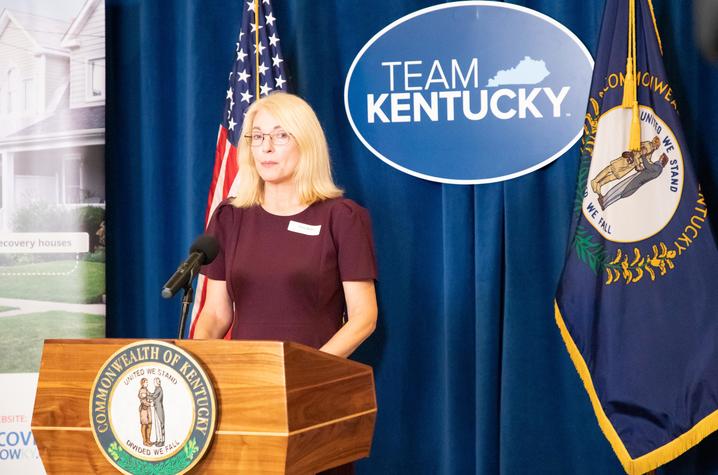KIPRC receives $2.2 million to evaluate Kentucky substance use disorder recovery program

LEXINGTON, Ky. (Nov. 23, 2022) — The Kentucky Injury Prevention and Research Center (KIPRC), led by Terry Bunn, Ph.D., was recently awarded a $2.2 million grant from the Centers for Disease Control and Prevention (CDC) National Center for Injury Prevention and Control to comprehensively evaluate the Kentucky Access to Recovery (KATR) program.
KIPRC, along with nonprofit collaborators Fahe, which administers KATR, and the Fletcher Group, will evaluate the long-term effectiveness of the KATR program. Researchers will evaluate the program's effectiveness at reducing the risk of nonfatal and fatal drug overdoses by increasing an individual’s recovery capital, reducing resumption of illicit substance use and promoting relinkage to recovery support services if illicit substances are resumed by following approximately 300 KATR program participants over a 12-month period.
“The results of this evaluation are essential to understand the importance of recovery support services in building recovery capital to achieve and sustain long-term recovery from substance use disorder among these vulnerable populations,” said Bunn, who is also the principal investigator on the grant.
The KATR program was launched in 2019 and has grown from 15 counties to 37 counties across the Commonwealth due, in part, to its partnership with Kentucky Opioid Response Effort (KORE) funding from the Substance Abuse and Mental Health Services Administration.
The program helps individuals recovering from opioid use disorder or stimulant use disorder or who have a history of overdose from opioid use. Recovery support services are free to low-income individuals in eligible service areas who are currently in treatment or early stages of recovery (completed treatment within the past year).
The KATR program does not pay for treatment itself but for resources that support recovery, such as housing and transportation, and is designed to supplement but not replace existing programs. The program provides recovery support assistance when other programs cannot. Individuals in the program need to have attempted to receive funds from existing programs first.
“From preliminary studies of one of the sites, we have learned that the program is bringing positive benefits to participants and to the community. In order for more people and places to have access to recovery support services, it is important that a rigorous evaluation of the program occur so that improvements, replications or expansion can potentially occur,” said KATR Director Joni Tamalonis, D.S.W.
The Fletcher Group will serve as a subawardee, with Ernie Fletcher, M.D., director and chief medical officer, and Robin Thompson, Dr.P.H., director of research and evaluation, acting as co-investigators. The Fletcher Group will assist with development, implementation and analysis of the project.
“We are thrilled to continue partnering with Dr. Bunn and the KIPRC research team on this project. Continued efforts to evaluate recovery support services, and interventions aimed at minimizing barriers to those recovery support services, are crucial to empowering individuals with a substance use disorder on their recovery journeys,” said Fletcher.
A process evaluation of the KATR linkage program also will be conducted to determine whether the KATR program is acceptable and accessible to vulnerable populations with illicit substance use disorder who are linked to recovery support services; identify barriers and facilitators to KATR program implementation; and assess the extent to which the KATR program was implemented as designed.
This project is supported by the Centers for Disease Control and Prevention (CDC) of the U.S. Department of Health and Human Services (HHS) as part of an award totaling $2.2 million with 0% financed with nongovernmental sources. The contents are those of the author(s) and do not necessarily represent the official views of, nor an endorsement, by CDC, HHS or the U.S. government. For more information, please visit CDC.gov.
KIPRC is a unique partnership between the Kentucky Department for Public Health (DPH) and the University of Kentucky’s College of Public Health. KIPRC serves both as an academic injury prevention research center and as the DPH’s designee or “bona fide agent” for statewide injury prevention and control.
Fahe brings people, organizations, and resources together to build homes, communities, and a thriving Appalachia through expanding economic opportunity and security for all. The Fahe Network, consisting of 50+ members, has cultivated the deepest reaching platform in Appalachia to connect transformative resources to local leaders in 100+ communities across Alabama, Kentucky, Maryland, Tennessee, West Virginia and Vifginia. Since 1980, Fahe has invested $1.63 billion, generating $1.73 billion in finance. This investment was channeled through their members and community partners, directly changing the lives of 858,043 people. www.fahe.org
Fletcher Group is a nonprofit organization founded in 2017 with a mission to research and promote effective practices and public policy that improve the health and well-being of individuals, families, and communities with a focus on addictive diseases, including opioid and substances use disorders.
As the state’s flagship, land-grant institution, the University of Kentucky exists to advance the Commonwealth. We do that by preparing the next generation of leaders — placing students at the heart of everything we do — and transforming the lives of Kentuckians through education, research and creative work, service and health care. We pride ourselves on being a catalyst for breakthroughs and a force for healing, a place where ingenuity unfolds. It's all made possible by our people — visionaries, disruptors and pioneers — who make up 200 academic programs, a $476.5 million research and development enterprise and a world-class medical center, all on one campus.




